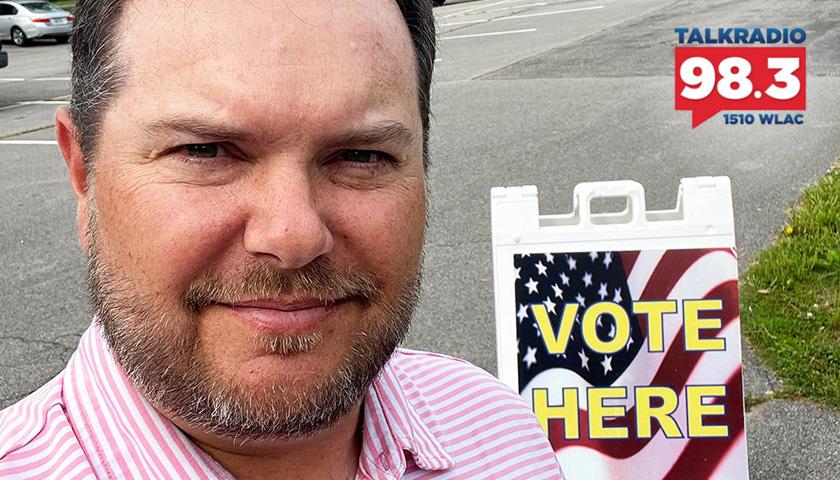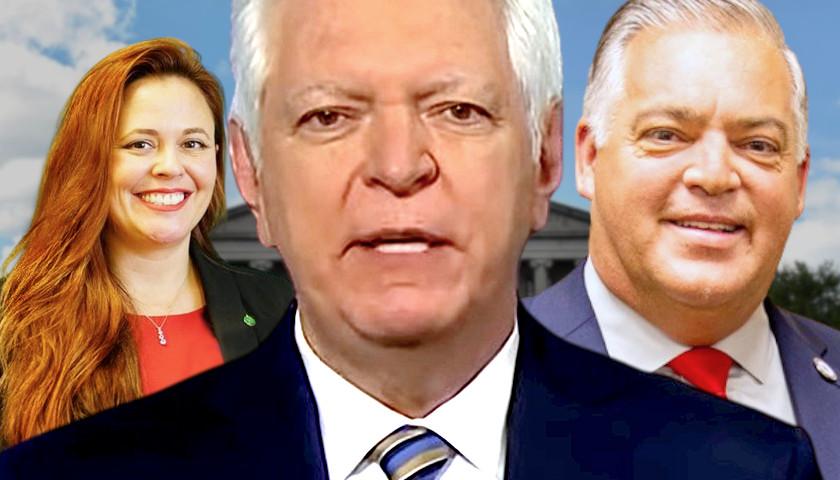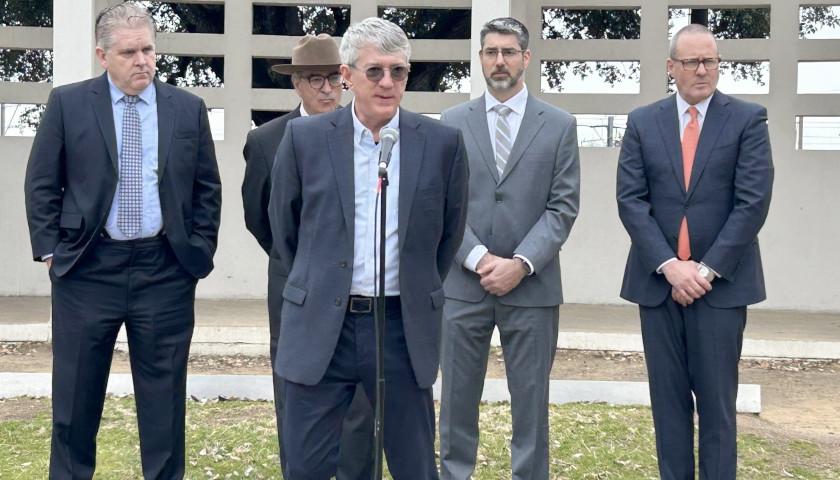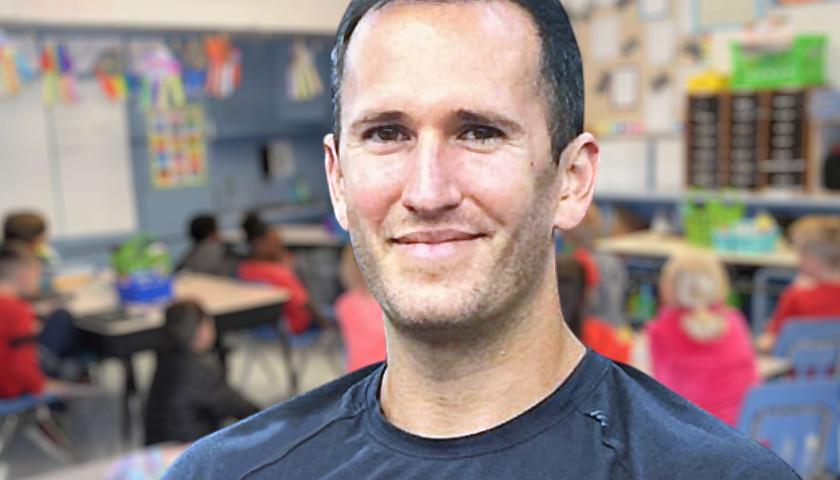Live from Music Row, Monday morning on The Tennessee Star Report with Michael Patrick Leahy – broadcast on Nashville’s Talk Radio 98.3 and 1510 WLAC weekdays from 5:00 a.m. to 8:00 a.m. – host Leahy welcomed Tennessee State Representative (R-TN-69) Jody Barrett in studio to explain the details of his proposed bill, HB 405 which would create closed primary elections for Tennesseans.
Leahy: Here on The Tennessee Star Report, the original all-star panelist Crom Carmichael and State Representative Jody Barrett and I. Don’t know if you’d say we’re working, but we’re having fun today. We’re talking about important issues.
One thing we’ll get to not today, but on Wednesday morning, Fran Bush is going to be in the studio. She’s running for mayor. Jeff Yarbro’s decided. Everybody’s running for mayor. Our favorite carpetbagger Jim Gingrich is running for mayor and Freddie O’Connell. Who am I missing? Sharon Hurt.
A lot of folks are running for mayor. But right now I’ve got an issue of state and legislative activities here that I want to talk about because we have the head of the freshman caucus at the state House of Representatives, Jody Barrett in studio. And just as an aside, you mentioned that you’re sponsoring this bill that our listeners have been clamoring for. I didn’t even know that you had the bill. You want to close primaries in Tennessee. Explain what this bill is.
Barrett: This bill was filed and brought by another freshman, Brian Ritchie from Maryville in Blount County. He’s actually the sponsor of this bill, and I have signed off with him as a co-prime sponsor. It’s House Bill 405 and it seeks to close statewide primaries to party voters only.
Leahy: So let’s go into the details of exactly how this would work. Forever, in Tennessee, you don’t register by party. You don’t come in and register and declare yourself, hey, I’m a Republican, I’m a Democrat. And in other states that have registration by party, you cannot vote in a primary unless you’re registered in that party.
It’s become very controversial here because there’s been of times when somebody’s crossed over. And of course, because we don’t have closed primaries, we have this situation where the GOP state party rules require for you to be a candidate in a primary, you have to have voted in three of the less four statewide primaries. And of course, there was a big brew ha ha.
And litigation over that when a couple of candidates challenged that rule of the party. The state supreme court ruled in favor of the party. But many have said, look, why go through all that stuff? Let’s just have closed primaries. How exactly will this work?
Barrett: So just like we have primaries now, it’s going to start with registering or applicants getting their petition in April and you’ll have a primary in August. The only difference is that Independents will not be able to vote in those primaries.
You’re going to have to decide or declare which party you’re going to be a part of and your ballot would simply have only those candidates. And when you do that, that’s going to declare which party you are a member of.
Leahy: So let’s get the details of this right now. I’m pretty sure I voted in like every Republican primary since I’ve lived here, but there’s no opportunity to register as a Republican. If there’s a primary coming up and if your bill passes, when would it go into effect?
Barrett: It would go into effect in the next primary vote that we have.
Leahy: 2024?
Barrett: Correct.
Leahy: So as an example, see what’s up. The Senate race would be an example, Marsha Blackburn, I’m sure she hasn’t announced, but she’ll be running for reelection. And if somebody challenges her in a primary. So let’s say I don’t do anything, but the primary comes up in August of 2024 and I show up. How do they know if I’m eligible to vote for that in that primary?
Barrett: To cover the first, I guess, implementation of this, the local election commission will look at the last primary that you voted in, and whichever primary that you voted in, you will be determined to be a member or registered in that party.
Leahy: Let’s just say it’s August of 2024 and I didn’t vote in any primary before, or maybe I voted in a maybe somebody voted in a Democrat primary, and that’s on their record if they show up and they go to the voting booth and say, I want to vote in the Republican primary, do the poll workers then look at your own registration and say, well, I’m sorry, sir. You voted in the Democrat primary last time. You, therefore, are a Democrat and can’t vote in the Republican primary. Is that how it would work?
Barrett: That’s right. But there would be an opportunity before that primary in order for you to change that registration ahead of time and notice will be sent out to all the voters, and you’d have an opportunity to change that.
Leahy: So now what you’re saying is, though, that you would have to register, is that right?
Barrett: That’s correct.
Leahy: Your bill then would say we would have to register by party.
Carmichael: No, it’s not the way he’s saying it. What he’s saying is it giving the example that you use for yourself, that if you had voted in a Democrat…
Leahy: They automatically call me a Republican, right?
Carmichael: No, they’re automatically going to call you a Democrat, but you would have plenty of time.
Leahy: Someone else. Let’s just be clear. I’ve never voted in a Democratic primary just to get the record straight. (Barrett chuckles) Just to get the record straight Crom.
Barrett: There will be phone calls coming in. (Leahy chuckles)
Carmichael: If somebody voted in a Democrat primary and then they would automatically be considered a Democrat.
Leahy: Unless they get something in the mail that says, would you like to register? And then you could then register as a Republican.
Carmichael: Correct. So you’ll have time ahead of time to if you believe that you’re a Republican, not a Democrat, then you can reregister, and now you’ll be a Republican. Then once you vote in that primary, then it’s not as easy. You’re now going to vote in the Republican primary going forward.
Barrett: Going forward. Correct. And if you’re an Independent that has not picked aside one way or the other, and you’re coming into a primary where you feel compelled to vote for one candidate or the other in either party, you will have the opportunity to register for that primary ahead of time.
Leahy: But you’d have to proactively register before the primary.
Barrett: Correct.
Leahy: In other words, don’t show up in the voting booth that day unless you’ve registered before and expect you’re going to get to vote in the primary.
Barrett: Correct.
Leahy: Is that the point? I think it was a very good idea. And by the way, Crom, I think our listing audience is going hoorah! Hoorah! Someone else, I think, went hoorah!
Barrett: This bill has already come out of the subcommittee, and at the subcommittee, Tennessee GOP chairman Scott Golden was there to testify in favor of the bill.
Leahy: He testified in favor of it?
Barrett: He did.
Leahy: I think a lot of people like this idea. Which subcommittee has it come out of?
Barrett: It came out of the Elections and Campaign Finance subcommittee. It now goes before the local government committee full this next week.
Listen to today’s show highlights, including this interview:
– – –
Tune in weekdays from 5:00 – 8:00 a.m. to The Tennessee Star Report with Michael Patrick Leahy on Talk Radio 98.3 FM WLAC 1510. Listen online at iHeart Radio.
Photo “Jody Barrett” by Jody Barrett For The 69th Tennessee House District.




